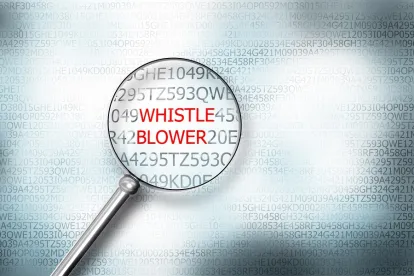The U.S. Court of Appeals for the Ninth Circuit recently joined the Second Circuit in holding in Somers v. Digital Realty Trust that whistleblowers are protected under the Dodd-Frank Act if they report securities-law violations internally and not to the Securities and Exchange Commission. By contrast, the Fifth Circuit, the only other federal circuit to weigh in, held that only those who report to the SEC are protected as “whistleblowers” under Dodd-Frank.
The Dodd-Frank Act protects whistleblowers from retaliation for reporting securities-law violations by their employers. See 15 U.S.C. § 78u-6(h)(1)(A). But who qualifies as a “whistleblower”? Dodd-Frank’s definition of “whistleblower” encompasses only those employees who report information to the Securities and Exchange Commission (“SEC”). See 15 U.S.C. § 78u-6(a)(6). Subdivision (iii) of Dodd-Frank’s anti-retaliation provision, however, explicitly protects those employees who make required or protected disclosures under SOX or other laws, rules, or regulations subject to SEC jurisdiction—which do not always require a whistleblower to report to the SEC. See 15 U.S.C. § 78u-6(h)(1)(A)(iii).
The U.S. Court of Appeals for the Ninth Circuit recently joined the Second Circuit in concluding that “[Dodd-Frank]’s anti-retaliation provision unambiguously and expressly protects from retaliation all those who report to the SEC and who report internally.” Somers v. Dig. Realty Tr. Inc., No. 15-17352, 2017 WL 908245, at *3 (9th Cir. Mar. 8, 2017). The Ninth Circuit held, alternatively, that if the term “whistleblower” is ambiguous, then courts should defer to the SEC’s interpretive rule that an employee does not need to report to the SEC to be protected as a “whistleblower” under Dodd-Frank. Id. at *4 (citing 17 C.F.R. § 240.21F-2).
The Ninth Circuit reasoned that the legislative intent behind Dodd-Frank and SOX supports its more inclusive interpretation of “whistleblower.”
Both SOX and Dodd-Frank were enacted following disastrous financial scandals. SOX is meant to protect investors from abuses by public companies; it requires that certain employees, such as attorneys and auditors, report suspected wrongdoing internally, and it protects them from retaliation for doing so. Dodd-Frank, similarly, was enacted to promote the stability of the U.S. economy by increasing financial transparency and protecting consumers from financial-services abuse. And Dodd-Frank’s anti-retaliation provision incorporates SOX’s disclosure requirements and protections by protecting employees who make disclosures pursuant to SOX or other laws, rules, or regulations subject to SEC jurisdiction. Thus, as the Second Circuit found, [i]f subdivision (iii) requires reporting to the [SEC], its express cross-reference to the provisions of Sarbanes-Oxley would afford an auditor almost no Dodd-Frank protection for retaliation because the auditor must await a company response to internal reporting before reporting to the Commission, and any retaliation would almost always precede Commission reporting. Id. at *3 (second alteration in original) (quoting Berman v. Neo@Ogilvy LLC, 801 F.3d 145, 151 (2d Cir. 2015)).
Noting that courts should “try to give effect to all statutory language,” the Ninth Circuit held that the more inclusive interpretation of “whistleblower” is preferable because applying the narrow definition would “all but read subdivision (iii) out of the statute.” Id. at *4.
The Ninth Circuit rejected the Fifth Circuit’s logic that the more inclusive interpretation of “whistleblower” would render SOX moot because whistleblowers would simply pursue claims under Dodd-Frank. Unlike Dodd-Frank, the Ninth Circuit concluded, SOX (1) allows for administrative review, whereby the Department of Labor handles the claim on behalf of the whistleblower, making it potentially less costly and stressful than bringing a Dodd-Frank claim in federal court; and (2) provides for special damages, which might outweigh the double back pay available under Dodd-Frank.



 />i
/>i

